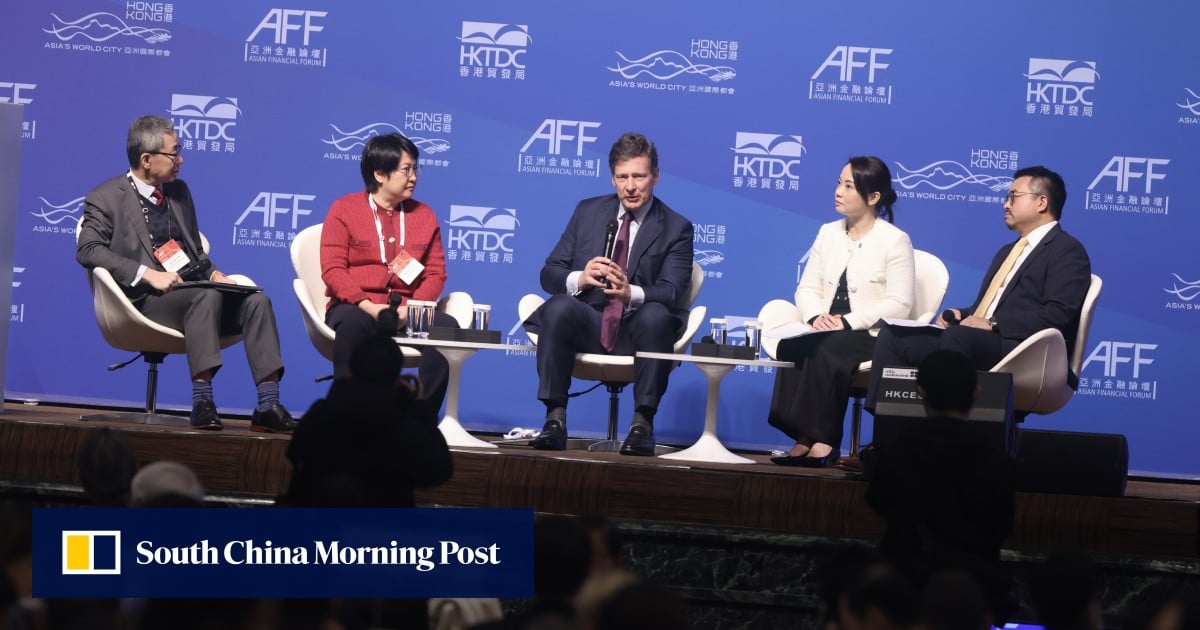Hong Kong’s role as the trading hub for offshore yuan will get a leg up from the policies unveiled by the People’s Bank of China to enhance wealth management and the Bond Connect transborder investment channel, according to speakers at the Asian Financial Forum (AFF).
The new policies will also benefit Hong Kong’s developers as they relaxed cross-border payment rules between the 11 cities of the Greater Bay Area to make it easier for the residents of Hong Kong and Macau to buy homes in southern China, said New World Development’s Chief Financial Officer Edward Lau Fu-keung.
“It is very beneficial to companies and other stakeholders,” Lau said during a panel discussion on the second day of the AFF in Hong Kong. “It is particularly helpful for companies like New World, with a strong presence in the Greater Bay Area,” as it stimulates transactions, he said.

Another new policy known as cross-boundary credit referencing will allow banks in Hong Kong and the mainland to share credit information of the companies.
“This will facilitate companies to do cross border financing and allow Hong Kong companies to take the cheap funding,” Lau said.

The policies will be a boon for central bank digital currencies such as Hong Kong’s e-HKD and the mainland’s e-CNY, as they get the go-ahead for simultaneous trials in the city.
The expansion of the Bond Connect allows foreign investors to use onshore bonds as collateral for yuan-denominated funding from the Hong Kong Monetary Authority. They will also get access to the onshore repo market. Both policies will be implemented on February 26.
These measures would help bond investors to enjoy better liquidity and help them better manage their portfolio risks, and hence will encourage more foreign investors to buy in the onshore yuan bond, said Karen Ng, managing director, China opening and RMB internationalisation of Standard Chartered.
HKMA nudges e-HKD with consultation on merits of digital currency
HKMA nudges e-HKD with consultation on merits of digital currency
Ding Chen, CEO of CSOP Asset Management, said the new measures announced by the PBOC on Wednesday and other developments in the Greater Bay Area will attract more overseas investors to trade in yuan and will also strengthen Hong Kong’s role as an offshore yuan trading centre.
“Hong Kong is the central part of the GBA and the development of the GBA will greatly improve the ecosystem of renminbi internationalisation,” Ding said. “This is because of the capacity that Hong Kong can easily access to the wealth of GBA. All these policies are [key in] promoting the global influence of the renminbi.”
Hong Kong can provide more investment products and risk management tools to meet the need for investors to manage their yuan portfolio, Ding said.
‘Higher quotas, more choice’ are key to Wealth Management Connect scheme
‘Higher quotas, more choice’ are key to Wealth Management Connect scheme
Alson Ho, head of Hong Kong Wealth Management at Standard Chartered said the new enhancement measures of the Wealth Management Scheme to be implemented from February 26 will boost sales.
The relaxation will allow residents in the nine Guangdong provincial cities that make up the GBA to invest up to 3 million yuan (US$420,000) each in Hong Kong’s wealth management products, triple the previous limit under the scheme. It will also expand product sales under the scheme to include the Greater China equities funds.
“The expansion of quota and products will encourage more wealth management clients to invest in the scheme,” Ho said at the AFF. “The relaxation of the sales process to allow banks to introduce products would also be important to boost sales.
The devil in Greater Bay Area’s blueprint stunts cross-border wealth plan
The devil in Greater Bay Area’s blueprint stunts cross-border wealth plan
Introduced in September 2021, the Wealth Management Connect scheme allows cross-border trading of investment products, but sales were poor due to the pandemic. Limited choices in the financial products and tough restrictions also sapped investors’ interest. New enhancement would solve the problem, Ho said.
UBS’ Asia chairman of global wealth management Amy Lo Choi-wan also welcomed the enhancements but wants the quota to rise further.
“It would need to increase the quota to US$1 million (HK$7.8 million) to make the scheme relevant to the private banking and wealth management sector,” she said on Wednesday in another panel at the AFF.

